Politics: Exploring Definitions and Core Concepts in Political Science
VerifiedAdded on 2023/04/22
|7
|2796
|233
Essay
AI Summary
This essay delves into the complex task of defining politics, exploring various perspectives and interpretations from different scholars and authorities. It examines politics as the art of government, focusing on the state and the exercise of power, and considers its role in managing public affairs. The essay also discusses politics as a means of resolving conflicts through negotiation, compromise, and conciliation, highlighting its function in distributing scarce resources and power within society. Furthermore, it addresses the concept of politics as power, emphasizing its pervasive influence on human existence and well-being. The essay concludes that politics is an inevitable process involving the exercise of political, economic, and ideological power, where a select few govern the masses. Desklib provides this essay and many other resources for students seeking academic support.
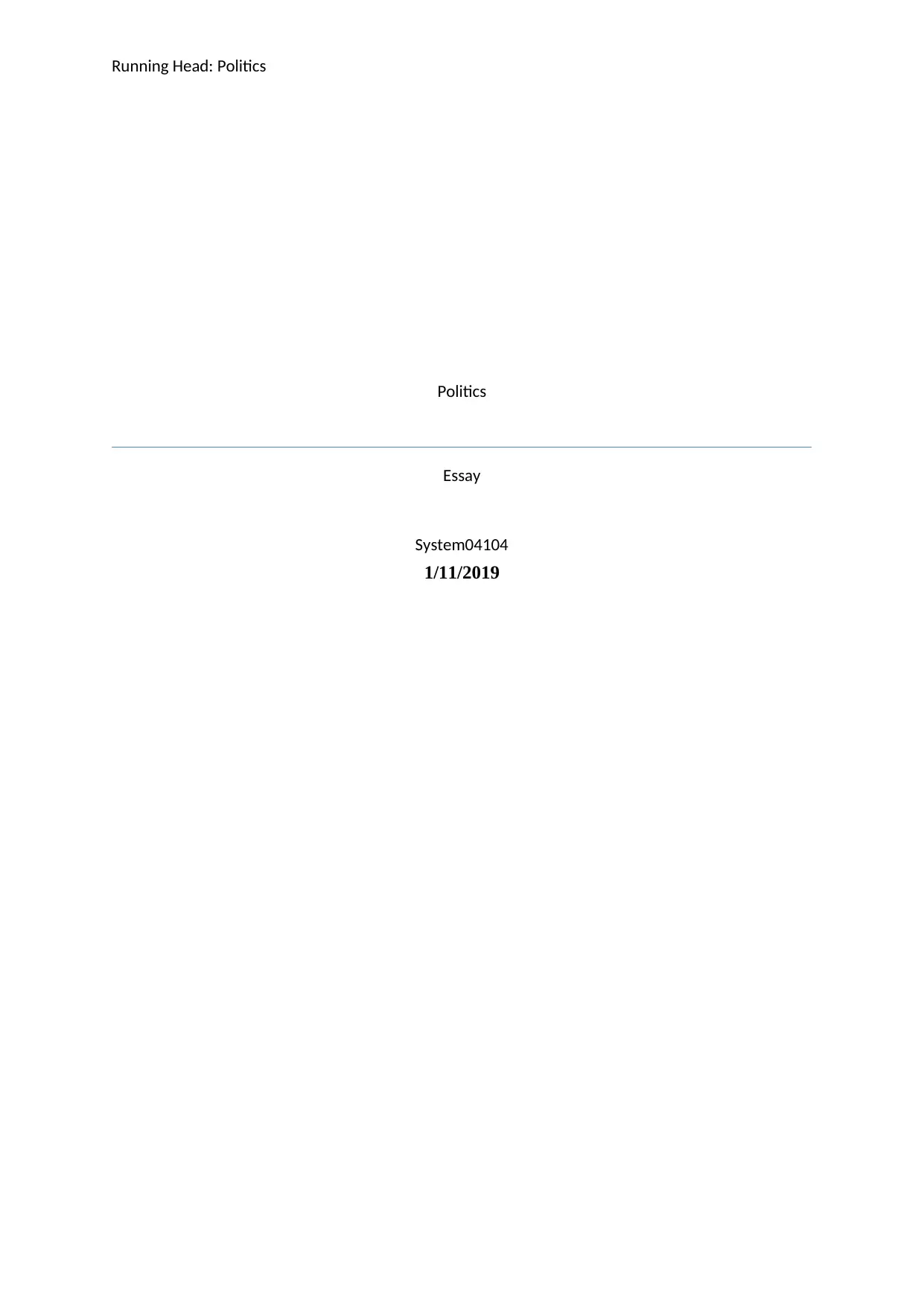
Running Head: Politics
Politics
Essay
System04104
1/11/2019
Politics
Essay
System04104
1/11/2019
Paraphrase This Document
Need a fresh take? Get an instant paraphrase of this document with our AI Paraphraser
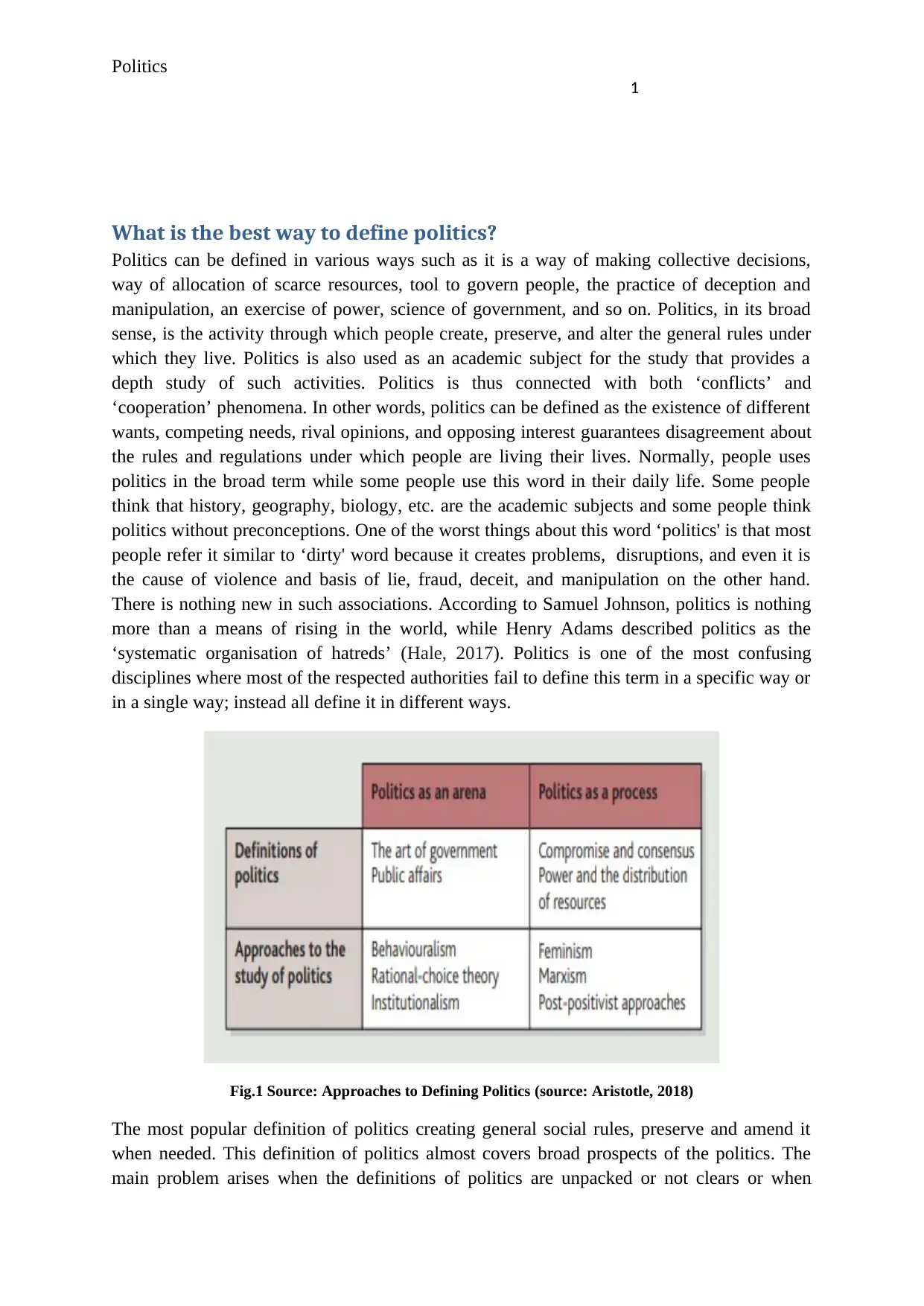
Politics
1
What is the best way to define politics?
Politics can be defined in various ways such as it is a way of making collective decisions,
way of allocation of scarce resources, tool to govern people, the practice of deception and
manipulation, an exercise of power, science of government, and so on. Politics, in its broad
sense, is the activity through which people create, preserve, and alter the general rules under
which they live. Politics is also used as an academic subject for the study that provides a
depth study of such activities. Politics is thus connected with both ‘conflicts’ and
‘cooperation’ phenomena. In other words, politics can be defined as the existence of different
wants, competing needs, rival opinions, and opposing interest guarantees disagreement about
the rules and regulations under which people are living their lives. Normally, people uses
politics in the broad term while some people use this word in their daily life. Some people
think that history, geography, biology, etc. are the academic subjects and some people think
politics without preconceptions. One of the worst things about this word ‘politics' is that most
people refer it similar to ‘dirty' word because it creates problems, disruptions, and even it is
the cause of violence and basis of lie, fraud, deceit, and manipulation on the other hand.
There is nothing new in such associations. According to Samuel Johnson, politics is nothing
more than a means of rising in the world, while Henry Adams described politics as the
‘systematic organisation of hatreds’ (Hale, 2017). Politics is one of the most confusing
disciplines where most of the respected authorities fail to define this term in a specific way or
in a single way; instead all define it in different ways.
Fig.1 Source: Approaches to Defining Politics (source: Aristotle, 2018)
The most popular definition of politics creating general social rules, preserve and amend it
when needed. This definition of politics almost covers broad prospects of the politics. The
main problem arises when the definitions of politics are unpacked or not clears or when
1
What is the best way to define politics?
Politics can be defined in various ways such as it is a way of making collective decisions,
way of allocation of scarce resources, tool to govern people, the practice of deception and
manipulation, an exercise of power, science of government, and so on. Politics, in its broad
sense, is the activity through which people create, preserve, and alter the general rules under
which they live. Politics is also used as an academic subject for the study that provides a
depth study of such activities. Politics is thus connected with both ‘conflicts’ and
‘cooperation’ phenomena. In other words, politics can be defined as the existence of different
wants, competing needs, rival opinions, and opposing interest guarantees disagreement about
the rules and regulations under which people are living their lives. Normally, people uses
politics in the broad term while some people use this word in their daily life. Some people
think that history, geography, biology, etc. are the academic subjects and some people think
politics without preconceptions. One of the worst things about this word ‘politics' is that most
people refer it similar to ‘dirty' word because it creates problems, disruptions, and even it is
the cause of violence and basis of lie, fraud, deceit, and manipulation on the other hand.
There is nothing new in such associations. According to Samuel Johnson, politics is nothing
more than a means of rising in the world, while Henry Adams described politics as the
‘systematic organisation of hatreds’ (Hale, 2017). Politics is one of the most confusing
disciplines where most of the respected authorities fail to define this term in a specific way or
in a single way; instead all define it in different ways.
Fig.1 Source: Approaches to Defining Politics (source: Aristotle, 2018)
The most popular definition of politics creating general social rules, preserve and amend it
when needed. This definition of politics almost covers broad prospects of the politics. The
main problem arises when the definitions of politics are unpacked or not clears or when
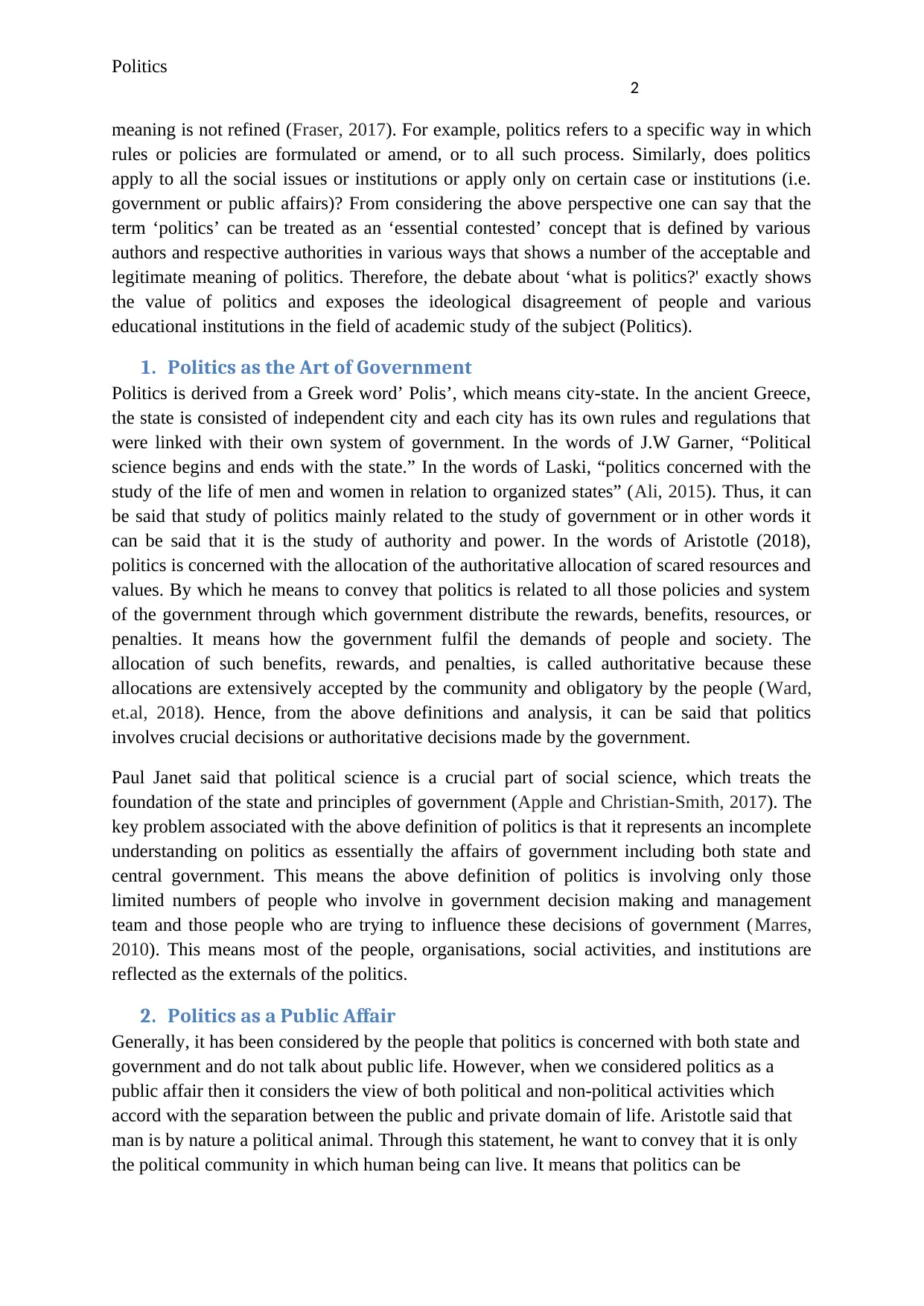
Politics
2
meaning is not refined (Fraser, 2017). For example, politics refers to a specific way in which
rules or policies are formulated or amend, or to all such process. Similarly, does politics
apply to all the social issues or institutions or apply only on certain case or institutions (i.e.
government or public affairs)? From considering the above perspective one can say that the
term ‘politics’ can be treated as an ‘essential contested’ concept that is defined by various
authors and respective authorities in various ways that shows a number of the acceptable and
legitimate meaning of politics. Therefore, the debate about ‘what is politics?' exactly shows
the value of politics and exposes the ideological disagreement of people and various
educational institutions in the field of academic study of the subject (Politics).
1. Politics as the Art of Government
Politics is derived from a Greek word’ Polis’, which means city-state. In the ancient Greece,
the state is consisted of independent city and each city has its own rules and regulations that
were linked with their own system of government. In the words of J.W Garner, “Political
science begins and ends with the state.” In the words of Laski, “politics concerned with the
study of the life of men and women in relation to organized states” (Ali, 2015). Thus, it can
be said that study of politics mainly related to the study of government or in other words it
can be said that it is the study of authority and power. In the words of Aristotle (2018),
politics is concerned with the allocation of the authoritative allocation of scared resources and
values. By which he means to convey that politics is related to all those policies and system
of the government through which government distribute the rewards, benefits, resources, or
penalties. It means how the government fulfil the demands of people and society. The
allocation of such benefits, rewards, and penalties, is called authoritative because these
allocations are extensively accepted by the community and obligatory by the people (Ward,
et.al, 2018). Hence, from the above definitions and analysis, it can be said that politics
involves crucial decisions or authoritative decisions made by the government.
Paul Janet said that political science is a crucial part of social science, which treats the
foundation of the state and principles of government (Apple and Christian-Smith, 2017). The
key problem associated with the above definition of politics is that it represents an incomplete
understanding on politics as essentially the affairs of government including both state and
central government. This means the above definition of politics is involving only those
limited numbers of people who involve in government decision making and management
team and those people who are trying to influence these decisions of government (Marres,
2010). This means most of the people, organisations, social activities, and institutions are
reflected as the externals of the politics.
2. Politics as a Public Affair
Generally, it has been considered by the people that politics is concerned with both state and
government and do not talk about public life. However, when we considered politics as a
public affair then it considers the view of both political and non-political activities which
accord with the separation between the public and private domain of life. Aristotle said that
man is by nature a political animal. Through this statement, he want to convey that it is only
the political community in which human being can live. It means that politics can be
2
meaning is not refined (Fraser, 2017). For example, politics refers to a specific way in which
rules or policies are formulated or amend, or to all such process. Similarly, does politics
apply to all the social issues or institutions or apply only on certain case or institutions (i.e.
government or public affairs)? From considering the above perspective one can say that the
term ‘politics’ can be treated as an ‘essential contested’ concept that is defined by various
authors and respective authorities in various ways that shows a number of the acceptable and
legitimate meaning of politics. Therefore, the debate about ‘what is politics?' exactly shows
the value of politics and exposes the ideological disagreement of people and various
educational institutions in the field of academic study of the subject (Politics).
1. Politics as the Art of Government
Politics is derived from a Greek word’ Polis’, which means city-state. In the ancient Greece,
the state is consisted of independent city and each city has its own rules and regulations that
were linked with their own system of government. In the words of J.W Garner, “Political
science begins and ends with the state.” In the words of Laski, “politics concerned with the
study of the life of men and women in relation to organized states” (Ali, 2015). Thus, it can
be said that study of politics mainly related to the study of government or in other words it
can be said that it is the study of authority and power. In the words of Aristotle (2018),
politics is concerned with the allocation of the authoritative allocation of scared resources and
values. By which he means to convey that politics is related to all those policies and system
of the government through which government distribute the rewards, benefits, resources, or
penalties. It means how the government fulfil the demands of people and society. The
allocation of such benefits, rewards, and penalties, is called authoritative because these
allocations are extensively accepted by the community and obligatory by the people (Ward,
et.al, 2018). Hence, from the above definitions and analysis, it can be said that politics
involves crucial decisions or authoritative decisions made by the government.
Paul Janet said that political science is a crucial part of social science, which treats the
foundation of the state and principles of government (Apple and Christian-Smith, 2017). The
key problem associated with the above definition of politics is that it represents an incomplete
understanding on politics as essentially the affairs of government including both state and
central government. This means the above definition of politics is involving only those
limited numbers of people who involve in government decision making and management
team and those people who are trying to influence these decisions of government (Marres,
2010). This means most of the people, organisations, social activities, and institutions are
reflected as the externals of the politics.
2. Politics as a Public Affair
Generally, it has been considered by the people that politics is concerned with both state and
government and do not talk about public life. However, when we considered politics as a
public affair then it considers the view of both political and non-political activities which
accord with the separation between the public and private domain of life. Aristotle said that
man is by nature a political animal. Through this statement, he want to convey that it is only
the political community in which human being can live. It means that politics can be
⊘ This is a preview!⊘
Do you want full access?
Subscribe today to unlock all pages.

Trusted by 1+ million students worldwide
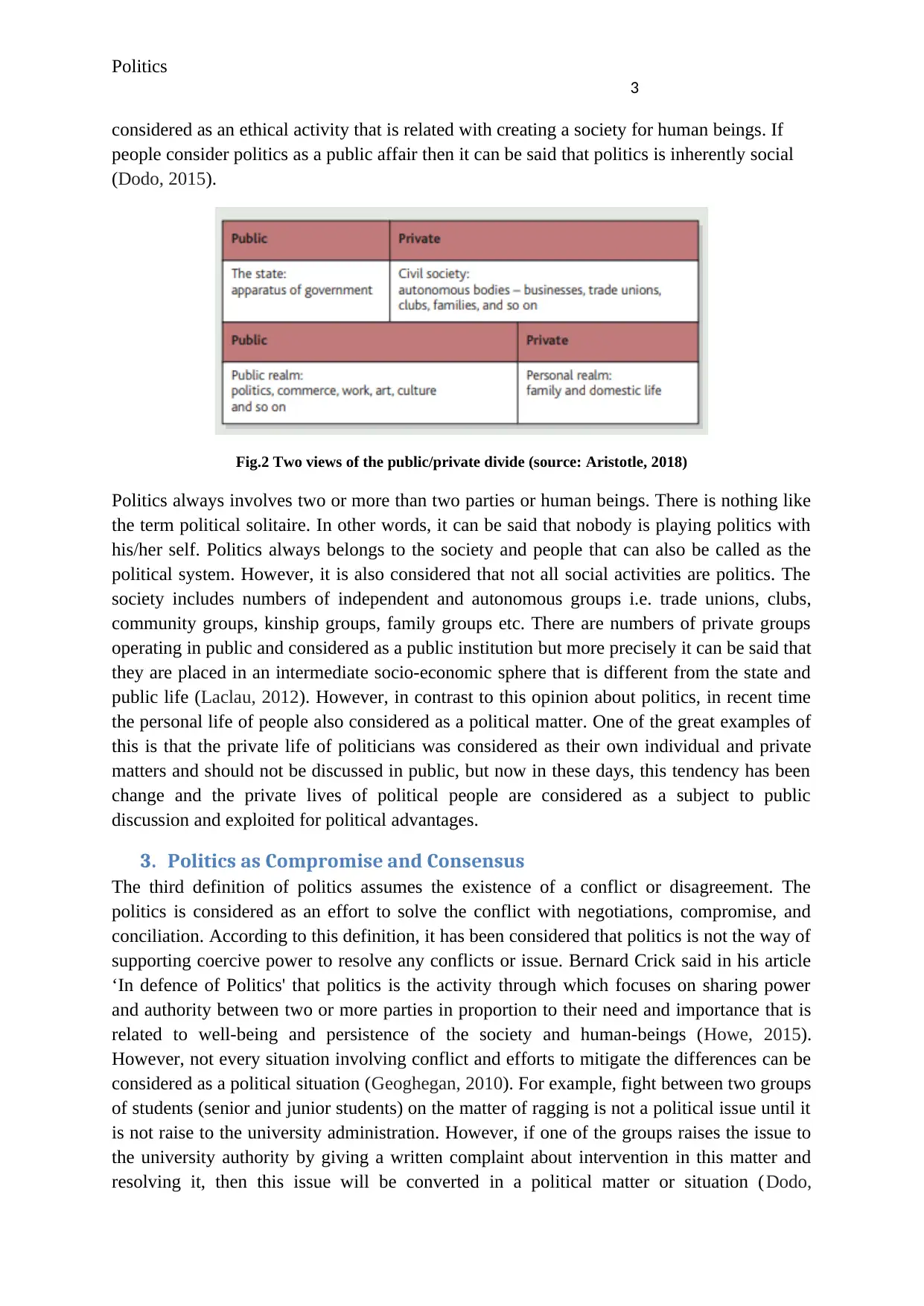
Politics
3
considered as an ethical activity that is related with creating a society for human beings. If
people consider politics as a public affair then it can be said that politics is inherently social
(Dodo, 2015).
Fig.2 Two views of the public/private divide (source: Aristotle, 2018)
Politics always involves two or more than two parties or human beings. There is nothing like
the term political solitaire. In other words, it can be said that nobody is playing politics with
his/her self. Politics always belongs to the society and people that can also be called as the
political system. However, it is also considered that not all social activities are politics. The
society includes numbers of independent and autonomous groups i.e. trade unions, clubs,
community groups, kinship groups, family groups etc. There are numbers of private groups
operating in public and considered as a public institution but more precisely it can be said that
they are placed in an intermediate socio-economic sphere that is different from the state and
public life (Laclau, 2012). However, in contrast to this opinion about politics, in recent time
the personal life of people also considered as a political matter. One of the great examples of
this is that the private life of politicians was considered as their own individual and private
matters and should not be discussed in public, but now in these days, this tendency has been
change and the private lives of political people are considered as a subject to public
discussion and exploited for political advantages.
3. Politics as Compromise and Consensus
The third definition of politics assumes the existence of a conflict or disagreement. The
politics is considered as an effort to solve the conflict with negotiations, compromise, and
conciliation. According to this definition, it has been considered that politics is not the way of
supporting coercive power to resolve any conflicts or issue. Bernard Crick said in his article
‘In defence of Politics' that politics is the activity through which focuses on sharing power
and authority between two or more parties in proportion to their need and importance that is
related to well-being and persistence of the society and human-beings (Howe, 2015).
However, not every situation involving conflict and efforts to mitigate the differences can be
considered as a political situation (Geoghegan, 2010). For example, fight between two groups
of students (senior and junior students) on the matter of ragging is not a political issue until it
is not raise to the university administration. However, if one of the groups raises the issue to
the university authority by giving a written complaint about intervention in this matter and
resolving it, then this issue will be converted in a political matter or situation (Dodo,
3
considered as an ethical activity that is related with creating a society for human beings. If
people consider politics as a public affair then it can be said that politics is inherently social
(Dodo, 2015).
Fig.2 Two views of the public/private divide (source: Aristotle, 2018)
Politics always involves two or more than two parties or human beings. There is nothing like
the term political solitaire. In other words, it can be said that nobody is playing politics with
his/her self. Politics always belongs to the society and people that can also be called as the
political system. However, it is also considered that not all social activities are politics. The
society includes numbers of independent and autonomous groups i.e. trade unions, clubs,
community groups, kinship groups, family groups etc. There are numbers of private groups
operating in public and considered as a public institution but more precisely it can be said that
they are placed in an intermediate socio-economic sphere that is different from the state and
public life (Laclau, 2012). However, in contrast to this opinion about politics, in recent time
the personal life of people also considered as a political matter. One of the great examples of
this is that the private life of politicians was considered as their own individual and private
matters and should not be discussed in public, but now in these days, this tendency has been
change and the private lives of political people are considered as a subject to public
discussion and exploited for political advantages.
3. Politics as Compromise and Consensus
The third definition of politics assumes the existence of a conflict or disagreement. The
politics is considered as an effort to solve the conflict with negotiations, compromise, and
conciliation. According to this definition, it has been considered that politics is not the way of
supporting coercive power to resolve any conflicts or issue. Bernard Crick said in his article
‘In defence of Politics' that politics is the activity through which focuses on sharing power
and authority between two or more parties in proportion to their need and importance that is
related to well-being and persistence of the society and human-beings (Howe, 2015).
However, not every situation involving conflict and efforts to mitigate the differences can be
considered as a political situation (Geoghegan, 2010). For example, fight between two groups
of students (senior and junior students) on the matter of ragging is not a political issue until it
is not raise to the university administration. However, if one of the groups raises the issue to
the university authority by giving a written complaint about intervention in this matter and
resolving it, then this issue will be converted in a political matter or situation (Dodo,
Paraphrase This Document
Need a fresh take? Get an instant paraphrase of this document with our AI Paraphraser
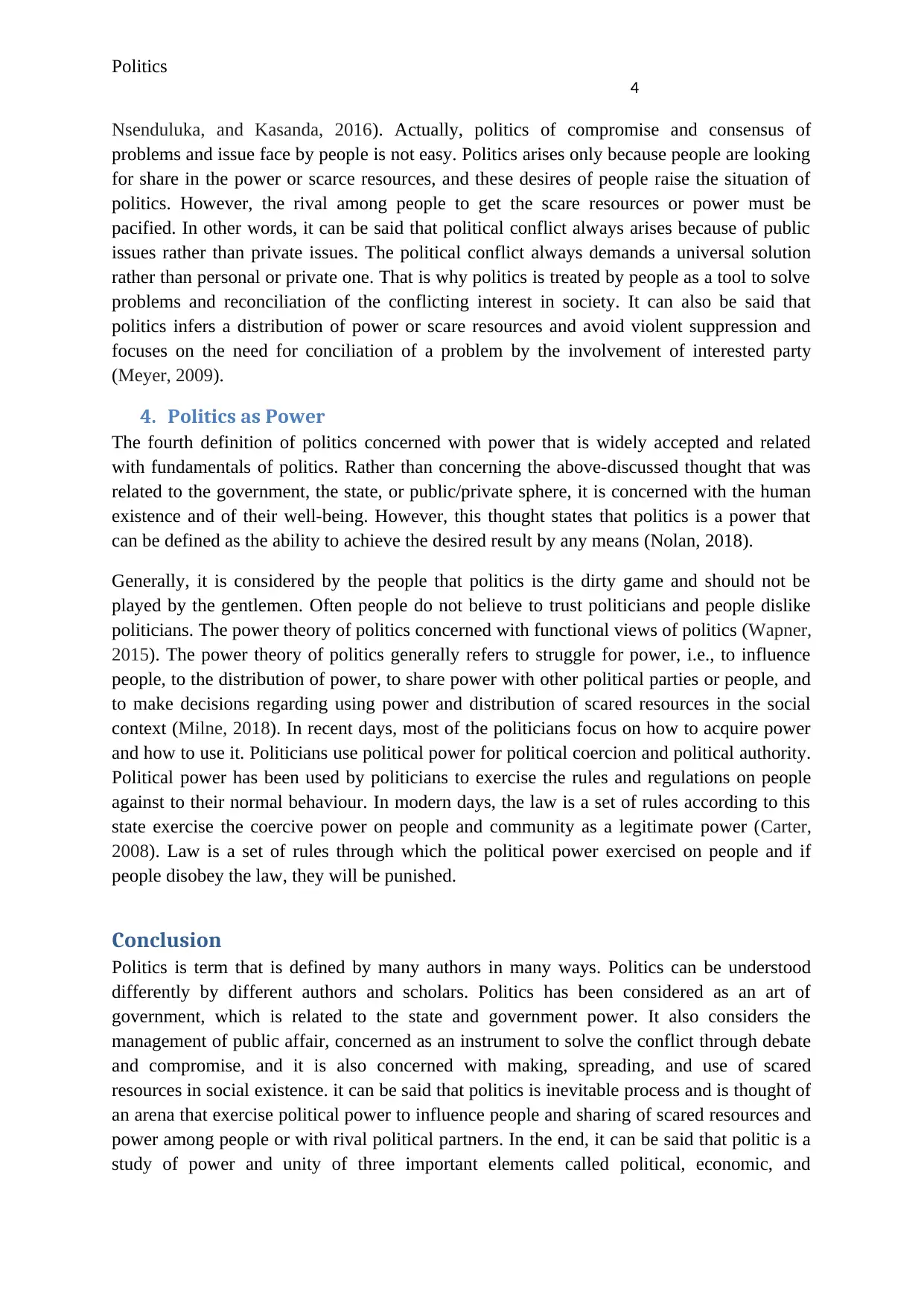
Politics
4
Nsenduluka, and Kasanda, 2016). Actually, politics of compromise and consensus of
problems and issue face by people is not easy. Politics arises only because people are looking
for share in the power or scarce resources, and these desires of people raise the situation of
politics. However, the rival among people to get the scare resources or power must be
pacified. In other words, it can be said that political conflict always arises because of public
issues rather than private issues. The political conflict always demands a universal solution
rather than personal or private one. That is why politics is treated by people as a tool to solve
problems and reconciliation of the conflicting interest in society. It can also be said that
politics infers a distribution of power or scare resources and avoid violent suppression and
focuses on the need for conciliation of a problem by the involvement of interested party
(Meyer, 2009).
4. Politics as Power
The fourth definition of politics concerned with power that is widely accepted and related
with fundamentals of politics. Rather than concerning the above-discussed thought that was
related to the government, the state, or public/private sphere, it is concerned with the human
existence and of their well-being. However, this thought states that politics is a power that
can be defined as the ability to achieve the desired result by any means (Nolan, 2018).
Generally, it is considered by the people that politics is the dirty game and should not be
played by the gentlemen. Often people do not believe to trust politicians and people dislike
politicians. The power theory of politics concerned with functional views of politics (Wapner,
2015). The power theory of politics generally refers to struggle for power, i.e., to influence
people, to the distribution of power, to share power with other political parties or people, and
to make decisions regarding using power and distribution of scared resources in the social
context (Milne, 2018). In recent days, most of the politicians focus on how to acquire power
and how to use it. Politicians use political power for political coercion and political authority.
Political power has been used by politicians to exercise the rules and regulations on people
against to their normal behaviour. In modern days, the law is a set of rules according to this
state exercise the coercive power on people and community as a legitimate power (Carter,
2008). Law is a set of rules through which the political power exercised on people and if
people disobey the law, they will be punished.
Conclusion
Politics is term that is defined by many authors in many ways. Politics can be understood
differently by different authors and scholars. Politics has been considered as an art of
government, which is related to the state and government power. It also considers the
management of public affair, concerned as an instrument to solve the conflict through debate
and compromise, and it is also concerned with making, spreading, and use of scared
resources in social existence. it can be said that politics is inevitable process and is thought of
an arena that exercise political power to influence people and sharing of scared resources and
power among people or with rival political partners. In the end, it can be said that politic is a
study of power and unity of three important elements called political, economic, and
4
Nsenduluka, and Kasanda, 2016). Actually, politics of compromise and consensus of
problems and issue face by people is not easy. Politics arises only because people are looking
for share in the power or scarce resources, and these desires of people raise the situation of
politics. However, the rival among people to get the scare resources or power must be
pacified. In other words, it can be said that political conflict always arises because of public
issues rather than private issues. The political conflict always demands a universal solution
rather than personal or private one. That is why politics is treated by people as a tool to solve
problems and reconciliation of the conflicting interest in society. It can also be said that
politics infers a distribution of power or scare resources and avoid violent suppression and
focuses on the need for conciliation of a problem by the involvement of interested party
(Meyer, 2009).
4. Politics as Power
The fourth definition of politics concerned with power that is widely accepted and related
with fundamentals of politics. Rather than concerning the above-discussed thought that was
related to the government, the state, or public/private sphere, it is concerned with the human
existence and of their well-being. However, this thought states that politics is a power that
can be defined as the ability to achieve the desired result by any means (Nolan, 2018).
Generally, it is considered by the people that politics is the dirty game and should not be
played by the gentlemen. Often people do not believe to trust politicians and people dislike
politicians. The power theory of politics concerned with functional views of politics (Wapner,
2015). The power theory of politics generally refers to struggle for power, i.e., to influence
people, to the distribution of power, to share power with other political parties or people, and
to make decisions regarding using power and distribution of scared resources in the social
context (Milne, 2018). In recent days, most of the politicians focus on how to acquire power
and how to use it. Politicians use political power for political coercion and political authority.
Political power has been used by politicians to exercise the rules and regulations on people
against to their normal behaviour. In modern days, the law is a set of rules according to this
state exercise the coercive power on people and community as a legitimate power (Carter,
2008). Law is a set of rules through which the political power exercised on people and if
people disobey the law, they will be punished.
Conclusion
Politics is term that is defined by many authors in many ways. Politics can be understood
differently by different authors and scholars. Politics has been considered as an art of
government, which is related to the state and government power. It also considers the
management of public affair, concerned as an instrument to solve the conflict through debate
and compromise, and it is also concerned with making, spreading, and use of scared
resources in social existence. it can be said that politics is inevitable process and is thought of
an arena that exercise political power to influence people and sharing of scared resources and
power among people or with rival political partners. In the end, it can be said that politic is a
study of power and unity of three important elements called political, economic, and
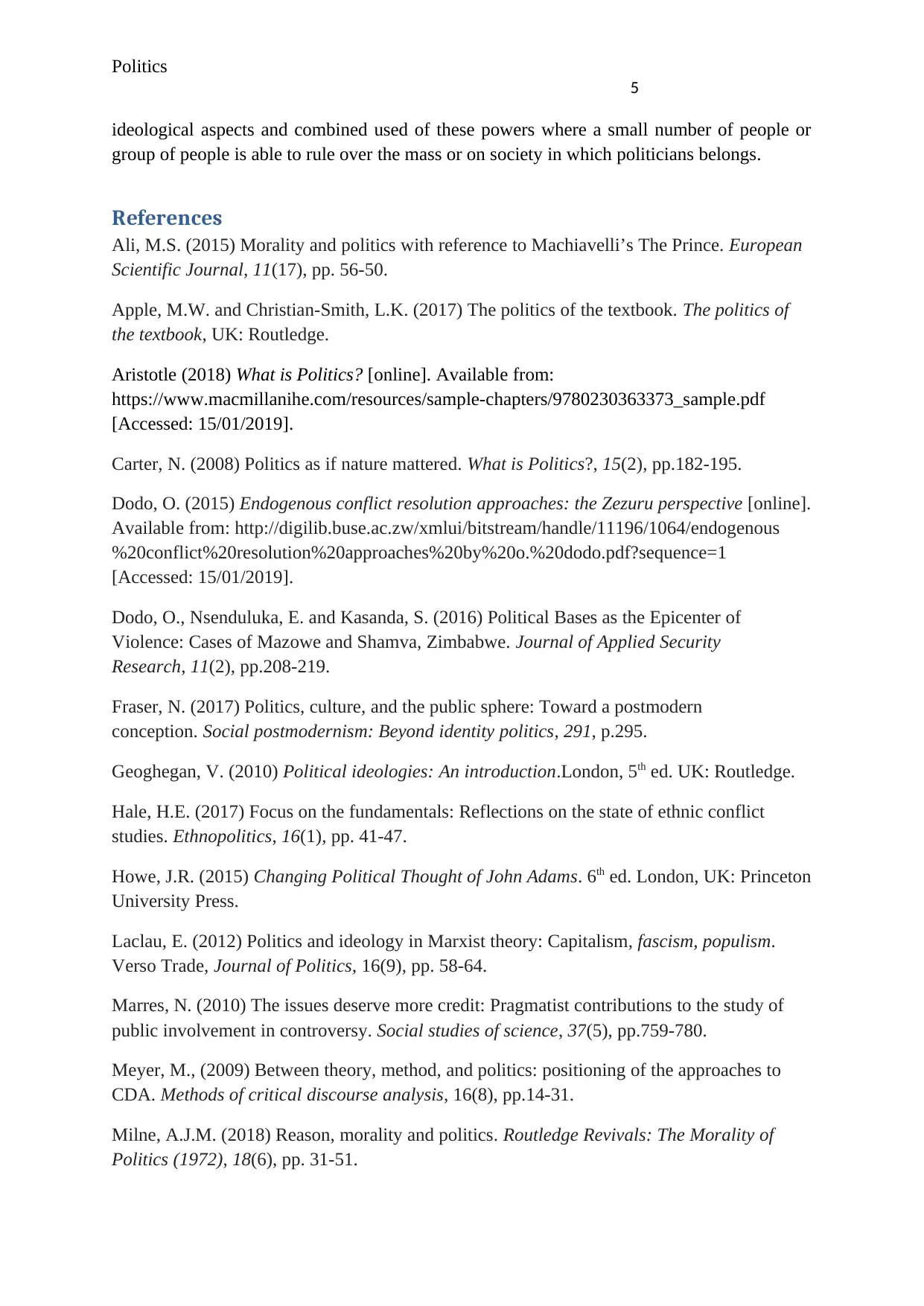
Politics
5
ideological aspects and combined used of these powers where a small number of people or
group of people is able to rule over the mass or on society in which politicians belongs.
References
Ali, M.S. (2015) Morality and politics with reference to Machiavelli’s The Prince. European
Scientific Journal, 11(17), pp. 56-50.
Apple, M.W. and Christian-Smith, L.K. (2017) The politics of the textbook. The politics of
the textbook, UK: Routledge.
Aristotle (2018) What is Politics? [online]. Available from:
https://www.macmillanihe.com/resources/sample-chapters/9780230363373_sample.pdf
[Accessed: 15/01/2019].
Carter, N. (2008) Politics as if nature mattered. What is Politics?, 15(2), pp.182-195.
Dodo, O. (2015) Endogenous conflict resolution approaches: the Zezuru perspective [online].
Available from: http://digilib.buse.ac.zw/xmlui/bitstream/handle/11196/1064/endogenous
%20conflict%20resolution%20approaches%20by%20o.%20dodo.pdf?sequence=1
[Accessed: 15/01/2019].
Dodo, O., Nsenduluka, E. and Kasanda, S. (2016) Political Bases as the Epicenter of
Violence: Cases of Mazowe and Shamva, Zimbabwe. Journal of Applied Security
Research, 11(2), pp.208-219.
Fraser, N. (2017) Politics, culture, and the public sphere: Toward a postmodern
conception. Social postmodernism: Beyond identity politics, 291, p.295.
Geoghegan, V. (2010) Political ideologies: An introduction.London, 5th ed. UK: Routledge.
Hale, H.E. (2017) Focus on the fundamentals: Reflections on the state of ethnic conflict
studies. Ethnopolitics, 16(1), pp. 41-47.
Howe, J.R. (2015) Changing Political Thought of John Adams. 6th ed. London, UK: Princeton
University Press.
Laclau, E. (2012) Politics and ideology in Marxist theory: Capitalism, fascism, populism.
Verso Trade, Journal of Politics, 16(9), pp. 58-64.
Marres, N. (2010) The issues deserve more credit: Pragmatist contributions to the study of
public involvement in controversy. Social studies of science, 37(5), pp.759-780.
Meyer, M., (2009) Between theory, method, and politics: positioning of the approaches to
CDA. Methods of critical discourse analysis, 16(8), pp.14-31.
Milne, A.J.M. (2018) Reason, morality and politics. Routledge Revivals: The Morality of
Politics (1972), 18(6), pp. 31-51.
5
ideological aspects and combined used of these powers where a small number of people or
group of people is able to rule over the mass or on society in which politicians belongs.
References
Ali, M.S. (2015) Morality and politics with reference to Machiavelli’s The Prince. European
Scientific Journal, 11(17), pp. 56-50.
Apple, M.W. and Christian-Smith, L.K. (2017) The politics of the textbook. The politics of
the textbook, UK: Routledge.
Aristotle (2018) What is Politics? [online]. Available from:
https://www.macmillanihe.com/resources/sample-chapters/9780230363373_sample.pdf
[Accessed: 15/01/2019].
Carter, N. (2008) Politics as if nature mattered. What is Politics?, 15(2), pp.182-195.
Dodo, O. (2015) Endogenous conflict resolution approaches: the Zezuru perspective [online].
Available from: http://digilib.buse.ac.zw/xmlui/bitstream/handle/11196/1064/endogenous
%20conflict%20resolution%20approaches%20by%20o.%20dodo.pdf?sequence=1
[Accessed: 15/01/2019].
Dodo, O., Nsenduluka, E. and Kasanda, S. (2016) Political Bases as the Epicenter of
Violence: Cases of Mazowe and Shamva, Zimbabwe. Journal of Applied Security
Research, 11(2), pp.208-219.
Fraser, N. (2017) Politics, culture, and the public sphere: Toward a postmodern
conception. Social postmodernism: Beyond identity politics, 291, p.295.
Geoghegan, V. (2010) Political ideologies: An introduction.London, 5th ed. UK: Routledge.
Hale, H.E. (2017) Focus on the fundamentals: Reflections on the state of ethnic conflict
studies. Ethnopolitics, 16(1), pp. 41-47.
Howe, J.R. (2015) Changing Political Thought of John Adams. 6th ed. London, UK: Princeton
University Press.
Laclau, E. (2012) Politics and ideology in Marxist theory: Capitalism, fascism, populism.
Verso Trade, Journal of Politics, 16(9), pp. 58-64.
Marres, N. (2010) The issues deserve more credit: Pragmatist contributions to the study of
public involvement in controversy. Social studies of science, 37(5), pp.759-780.
Meyer, M., (2009) Between theory, method, and politics: positioning of the approaches to
CDA. Methods of critical discourse analysis, 16(8), pp.14-31.
Milne, A.J.M. (2018) Reason, morality and politics. Routledge Revivals: The Morality of
Politics (1972), 18(6), pp. 31-51.
⊘ This is a preview!⊘
Do you want full access?
Subscribe today to unlock all pages.

Trusted by 1+ million students worldwide
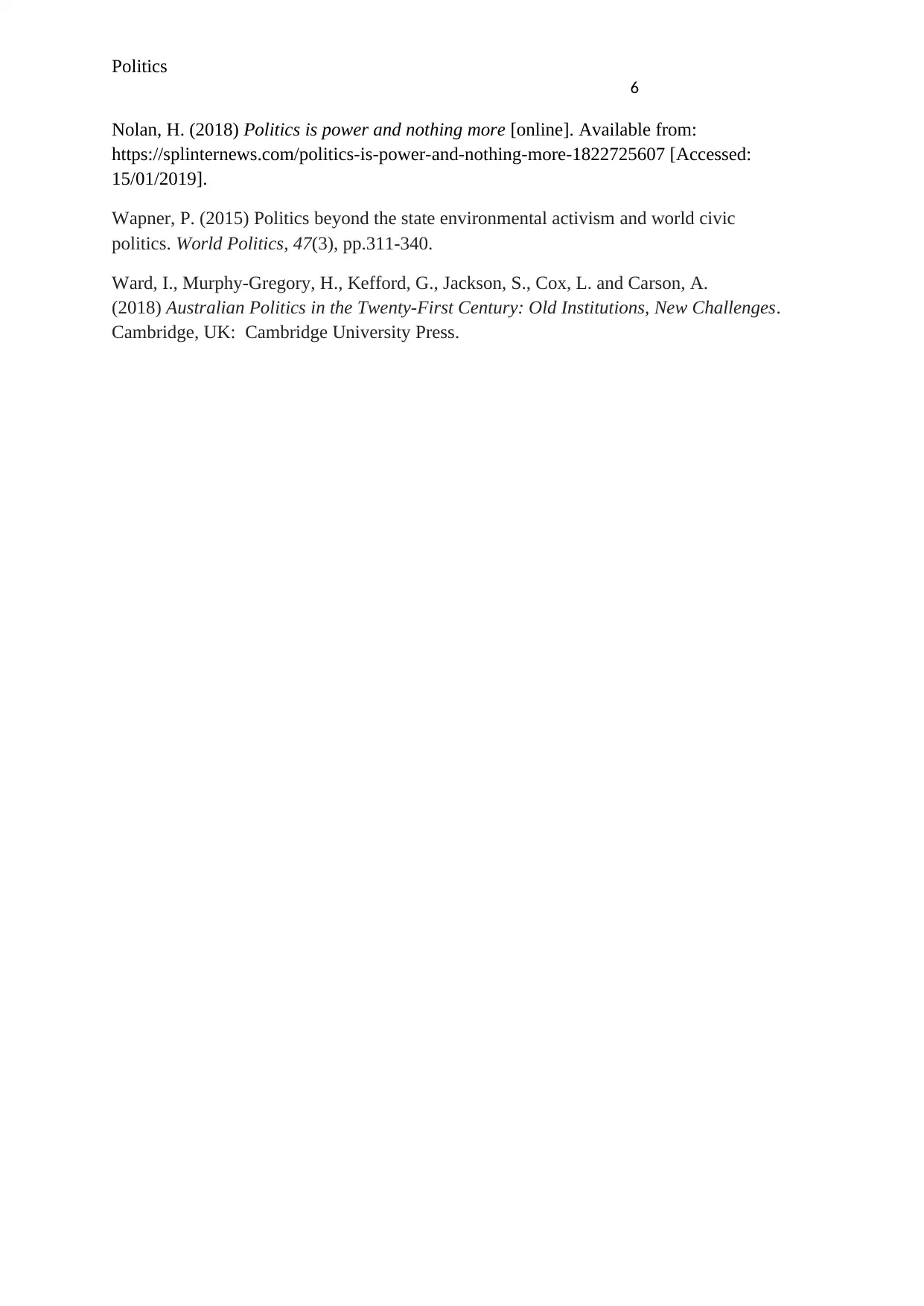
Politics
6
Nolan, H. (2018) Politics is power and nothing more [online]. Available from:
https://splinternews.com/politics-is-power-and-nothing-more-1822725607 [Accessed:
15/01/2019].
Wapner, P. (2015) Politics beyond the state environmental activism and world civic
politics. World Politics, 47(3), pp.311-340.
Ward, I., Murphy-Gregory, H., Kefford, G., Jackson, S., Cox, L. and Carson, A.
(2018) Australian Politics in the Twenty-First Century: Old Institutions, New Challenges.
Cambridge, UK: Cambridge University Press.
6
Nolan, H. (2018) Politics is power and nothing more [online]. Available from:
https://splinternews.com/politics-is-power-and-nothing-more-1822725607 [Accessed:
15/01/2019].
Wapner, P. (2015) Politics beyond the state environmental activism and world civic
politics. World Politics, 47(3), pp.311-340.
Ward, I., Murphy-Gregory, H., Kefford, G., Jackson, S., Cox, L. and Carson, A.
(2018) Australian Politics in the Twenty-First Century: Old Institutions, New Challenges.
Cambridge, UK: Cambridge University Press.
1 out of 7
Related Documents
Your All-in-One AI-Powered Toolkit for Academic Success.
+13062052269
info@desklib.com
Available 24*7 on WhatsApp / Email
![[object Object]](/_next/static/media/star-bottom.7253800d.svg)
Unlock your academic potential
Copyright © 2020–2025 A2Z Services. All Rights Reserved. Developed and managed by ZUCOL.





